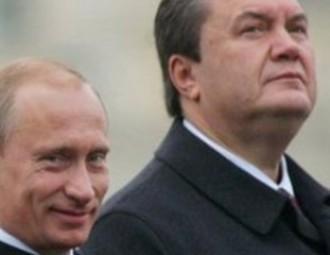Yanukovich has surrendered Ukraine to Russia

President Viktor Yanukovich signed a strategic partnership agreement with Russia, which eliminates differences on Ukraine-Customs Union trade and economic policies.
Ukraine’s government has pushed forward with closer ties to Russia, while protesters remain massed in central Kyiv, demanding closer ties to the European Union, RFE/RL reports.
President Viktor Yanukovich, returning from a trip to China, held talks December 6 with President Vladimir Putin in the Russian Black Sea resort of Sochi.
Ukrainian Prime Minister Mykola Azarov said the talks concerned the drafting of what he called a “a big strategic partnership agreement” aimed at eliminating differences on trade and economic policies. Azarov said the Ukrainian and Russian sides also discussed questions around Russian gas supplies to Ukraine.
In Moscow, a spokesman for Putin, Dmitry Peskov, confirmed on December 7 that the talks touched upon "cooperation in energy," adding: "No final agreement has been reached." However, Peskov told reporters that Ukraine's possible accession to the Moscow-led Customs Union was not discussed. Peskov added that Putin and Yanukovich discussed financial cooperation as well as the agenda for a meeting between the two governments, set for December 17 in Moscow.
It was not immediately clear whether Yanukovich’s trip to China had resulted in any fresh aid to Ukraine. The government needs assistance to pay billions of dollars of debt repayments and Russian gas bills.
In Kyiv, meanwhile, world boxing champion and opposition leader Vitaly Klitschko reminded demonstrators that Yanukovich’s government had stymied hopes that Ukrainians could, as he put it, “begin to live in a European country where reforms take place.” "Everyone thought the European Union association agreement would be signed and we would begin to live in a European country where reforms take place," Klitschko said, "so that law would be in place, so that judges would make decisions not based on money, or phone call, but out of justice."
Also in Kyiv, another opposition figure accused Yanukovich of betraying national interests. Arseny Yatsenyuk, the leader of the opposition Batkivshchyna faction, told crowds gathered on Independence Square on December 7 that Yanukovich is "only interested in his own personal fate." "He needs money for the survival of his regime," Yatsenyuk added.
Let us recall that the mass pro-European demonstrations began last month after Yanukovich rejected signing EU trade and association accords, which had been negotiated for years, and instead pledged to pursue links to Russia. Moscow wants Ukraine join a Russia-led Eurasian Customs Union and scale back its cooperation with the EU. The demonstrators, who have been publicly backed by many Western politicians, are demanding the ouster of the government, new elections, and the punishment of police responsible for violence against demonstrators. They face a court-ordered deadline of early next week to end their blockade of government facilities.
In another development, former Moldovan Prime Minister Vlad Filat told RFE/RL's Moldovan Service that he is in Kyiv to show that his Liberal Democratic Party, which is part of the ruling coalition, is backing the protesters. Filat said he is planning to address the pro-European demonstrators later on December 7 with former Georgian President Mikheil Saakashvili. Both Moldova and Georgia initialled association and free-trade agreements with the European Union last month.
Meanwhile, in related news, Yevhenia Timoshenko, the daughter of jailed former Prime Minister Julia Timoshenko, said her mother had decided to end her hunger strike, at the request of supporters.
Timoshenko started the hunger strike November 25 to protest the government’s decision to reject signing the EU association agreement. Timoshenko is serving a seven-year sentence after being convicted of abuse of power. The EU has demanded her release. Critics accuse the government of using "selective justice," or politically motivated prosecution, against Timoshenko.
-
03.01
-
07.10
-
22.09
-
17.08
-
12.08
-
30.09










































